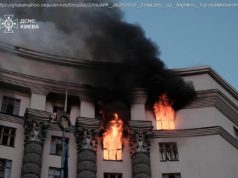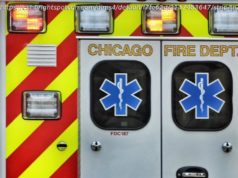The victims were drivers for a Johannesburg minibus taxi association, the latest casualties in a decades-long battle over taxi routes that has claimed hundreds of lives.
CAPE TOWN — Their minibus taxi was traveling down a quiet rural road in eastern South Africa on Saturday night, when gunmen with automatic weapons opened fire, killing 11 people and critically injuring four.
The victims were all drivers for a Johannesburg minibus taxi association, said Brig. Vishnu Naidoo, a national police spokesman — the latest casualties in a decades-long battle over taxi routes that has claimed hundreds of lives.
The drivers had been returning from a colleague’s funeral in KwaZulu Natal Province when the ambush took place.
“Large parts of the industry have begun to look very Mafia-like, where you defend and expand your business turf through the use of violence,” said Mark Shaw, the director of the Global Initiative Against Transnational Organized Crime and author of a recent book on assassinations in South Africa.
“The most lucrative routes are long-distance, such as between Johannesburg and Kwa-Zulu Natal,” Mr. Shaw added. “That’s why there’s so much conflict.”
Images shared on Twitter over the weekend showed more than 250 bullet holes peppering the minibus taxi.
More than 200,000 minibus taxis operate nationally, carrying around 15 million people each day, according to the South African National Taxi Council, or Santaco. The country’s largest yet most poorly regulated transport sector, it accounts for nearly two-thirds of all non-private commuter trips in South Africa, with an estimated annual revenue of more than $1.2 billion, Santaco says.
In many parts of the country, minibus taxis are the only viable transport option, as they cover routes not serviced by buses or trains. Outside major cities, taxis are a also major source of income and employment.
Yet since its inception in the 1980s, South Africa’s minibus taxi industry has been governed in large part by violence, with documented links to political assassinations and other forms of organized crime.
The industry was officially born in 1987, when the apartheid government deregulated public transport, which had previously been controlled by a central agency. By the end of the decade, the 16-seater minibus taxis, known as “combis,” were ubiquitous across the country, particularly in townships and rural “homelands” established for black people.
“As one of the first avenues for black capital accumulation, the taxi industry almost immediately became a contested economic terrain, swamped with aspirant operators,” Jackie Dugard, who at the time was an analyst with the Commonwealth Secretariat in London, wrote in “From Low Intensity War to Mafia War, ” a 2001 study on taxi violence.
“Taxi associations have developed as informal agents of regulation, protection and extortion,” Ms. Dugard added in the study, published by the Centre for the Study of Violence and Reconciliation in Cape Town. “Taxi violence has become more widespread, decentralized and criminal in character.”
Conflict over routes was exacerbated by the rise of sectarian violence after apartheid formally ended in 1990.
“This is an industry that moves millions of people and brings a great deal of prosperity to black communities,” Mr. Shaw said. “In small towns, it’s often the one clear source of resources for black people. But there is violence in the DNA of the industry.”
Of all the assassinations in South Africa between 2000 and 2017,43 percent were related to the taxi industry, according to Assassination Witness, a contract-killings database run by Mr. Shaw and other researchers.
“There’s been a significant upswing since 2011,” Mr. Shaw said, adding that since then, taxi-related hits have “consistently made up about half” of the annual total.
Underlying the persistent conflict is an oversupply of taxi operators, experts say, with insufficient government oversight.
Saturday’s attack took place in KwaZulu-Natal Province, which the database identifies as a national “hot spot” for political and taxi-related killings. But the violence extends across the country. In May, 10 taxi drivers were killed in a single weekend in Cape Town.
The drivers killed on Saturday belonged to the Ivory Park Taxi Association, based in Johannesburg’s Midrand area. Another of the association’s taxi owners was murdered in May, after the killing of another member in 2016. The association could not be reached for comment.
South Africa’s police commissioner announced a “72-hour action plan,” involving several specialist units, to investigate the attack. No arrests had been made as of Sunday night.
Домой
United States
USA — Events In South Africa’s ‘Mafia-Like’ Taxi Industry, 11 Die in Latest Attack






